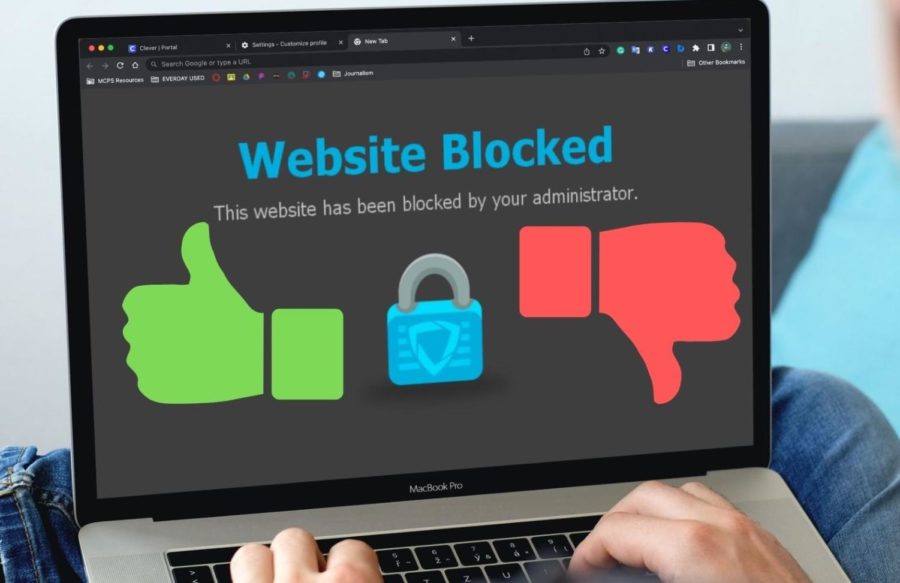Pro/Con: Are Web Filters on Student Computers Really Necessary?
May 16, 2022
PRO:
In December of 2000, The Child Internet Protection Act (CIPA) was signed into law. Ever since, school districts all over the country, including MCPS, have started moderating the students’ internet access, sparking the controversy of web blocking and filtering. While students overarchingly dislike the filtering, these policies are necessary to protect pupils of all ages from dangerous material online.
The Child Internet Protection Act provides much-needed discount rates for internet usage to the schools and libraries that comply with its requirements, including blocking or filtering obscene images, child pornography, and content deemed harmful to minors.
Web filters are installed on the school-distributed Chromebooks, as well as all in-school desktops, and limit access to the above dangerous material as well as certain entertainment, gaming, and chatroom websites in order to protect and keep students on track.
While some restrictions are arguably unnecessary for high school students, who would likely have extensive knowledge of the internet and can traverse it safely; the same can not be said for many of the younger elementary and middle school kids accessing the same county computers. These filters are essential for kids who are naive and inexperienced with the depths of the internet, as only a few wrong clicks or poorly phrased searches can leave students vulnerable to dangerous results.
In addition to protecting students from viewing harmful content, it is essential to remember that web-blocking has other uses. For example, it safeguards students against hacking, viruses, theft of personal information, and other online attacks.
One of the main gripes that students have with the filtering is that, on occasion, it will block content that they are trying to access for research on their assignments.
This is a valid concern, and MCPS tries to repair this when possible, but there is almost always a reason why the site was flagged in the first place.
While there are some good critiques to be taken into consideration, when it comes to the internet safety of children and teens, it is always better to be safe than sorry, which is why web blocking in schools is needed.
CON:
Throughout the years, schools have upped their computer usage drastically for learning; this has increased the use of web filters. Many students feel different ways about these filters, which ultimately leads us to the big question: do these web filters actually hurt students more than they benefit them?
Web filters restrict and control what websites a user can view on the internet. School-issued Chromebooks and desktops at schools have web filters installed. These web filters are designed to restrict students from accessing inappropriate content and curb students from playing games or consuming entertainment during instructional time. They can be seen as something beneficial for students, however, filtering poses no true benefits for students.
Web filtering does not teach students how to browse the web, in fact, it does the opposite. Once a student goes home or uses their phone, they can interact and access whatever they want. Therefore, by using a web filter, a student becomes a naive internet user as they have not properly learned how to browse the web and developed digital literacy skills.
Web filtering many times has blocked my friends and I from accessing information needed for research. Blocking websites that are needed to complete assignments hurts one’s learning. Students at a financial disadvantage are hurt even more by this; if school internet is the only way to access the web and they can not get the info they need, which can be detrimental to completing assignments.
Using a web filter comes at a cost, the money budgeted for web filtering could be allocated to more worthwhile expenses. While the exact cost of web filtering is unknown, we can assume it comes at a hefty price. According to MCPS in the fall of 2020, there were 160,564 students enrolled in school, these are all students who have web filters installed, which is very expensive.
Web filters allow teachers and staff to monitor what students are doing on their devices without their consent, which can be considered an invasion of privacy. If web filters truly worked, teacher supervision should not be necessary.
A student can go on their phone or simply not do their work so using a web filter to help curb this is redundant.
In the end having a web filter on school-distributed Chromebooks is limiting students’ ability to engage in authentic digital learning.
